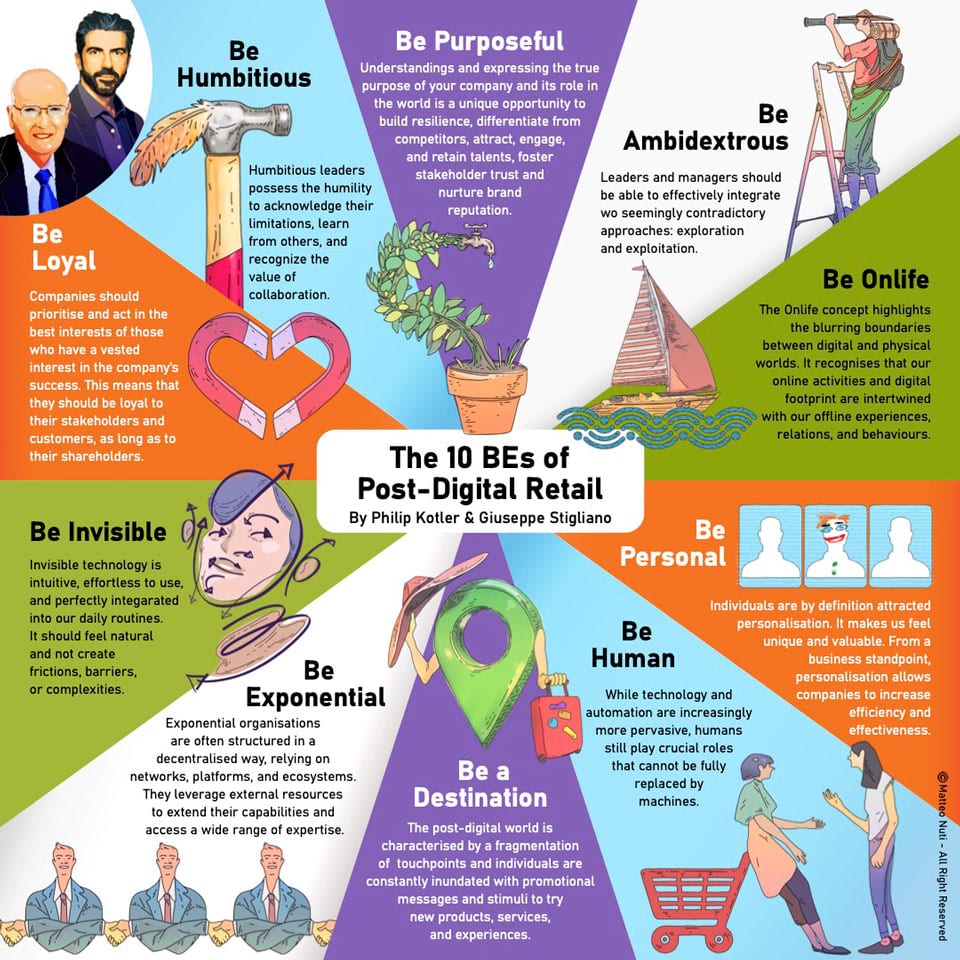The 10 Commandments of Retail: According to Prof. Philip Kotler and Dr. Giuseppe Stigliano

In their latest book, Redefining Retail: 10 Guiding Principles for a Post-Digital World, uber-famous Prof. Philip Kotler, the father of modern marketing, and Dr. Giuseppe Stigliano, Global CEO at Spring Studios, give us their view on the future of retail business, and, as a matter of fact, of marketing per se.
Here are the ten principles, or ‘be’ as they call them, listed for any retail and business to survive in today’s world, where change is the only constant.
- Be Humbitious: Humbitious leaders possess the humility to acknowledge their limitations, learn from others, and recognize the value of collaboration.
- Be Purposeful: Understanding and expressing the true purpose of your company and its role in the world is a unique opportunity to build resilience, differentiate from competitors, attract, engage, and retain talents, foster stakeholder trust and nurture brand reputation.
- Be Ambidextrous: Leaders and managers should be able to effectively integrate without seemingly contradictory approaches: exploration and exploitation.
- Be Onlife: The Onlife concept highlights the blurring boundaries between digital and physical worlds. It recognizes that our online activities and digital footprint are intertwined with our offline experiences, relations, and behaviors.
- Be Personal: Individuals are, by definition, attracted by personalization. It makes us feel unique and valuable. From a business standpoint, personalization allows companies to increase efficiency and effectiveness.
- Be Human: While technology and automation are increasingly more pervasive, humans still play crucial roles that cannot be fully replaced by machines.
- Be a Destination: The post-digital world is characterized by a fragmentation of touchpoints and individuals are constantly inundated with promotional messages and stimuli to try new products, services, and experiences.
- Be Exponential: Exponential organizations are often structured in a decentralized way, relying on networks, platforms, and ecosystems. They leverage external resources to extend their capabilities and access a wide range of expertise.
- Be Invisible: Invisible technology is intuitive, effortless to use, and perfectly integrated into our daily routines. It should feel natural and not create frictions, barriers, or complexities.
- Be Loyal: Companies should prioritize and act in the best interests of those who have a vested interest in the company’s success. This means that they should be loyal to their stakeholders and customers, as well as to their shareholders.

I recently sat down with Giuseppe Stigliano (GS), one of the authors, for a few additional questions.
You list the 10 commandments for Retail in your new book. What is the #1 priority, in terms of importance or time. Namely, if I am a CEO, where do I start?
Giuseppe Stigliano: In today’s volatile, fragmented, and hyper-competitive market, managers and entrepreneurs aiming to thrive should begin by embracing the mindset outlined in our guiding principle number one: Be Humbitious. This term combines humility with ambition, advocating for leaders who possess the humility to acknowledge what they don’t know and the ambition to continuously learn and adapt. It’s about balancing confidence with introspection in a way that inspires innovation and drives sustainable growth.
Globalization and growth (topline) at all costs have failed miserably, I believe. Be local and be profitable seem to be more important than scaling up globally and having double digit topline increase every year. What’s your take on globalization of retail and the need to also protect its bottom line?
Giuseppe Stigliano: When it comes to growth and global scale, we recommend a shift from the traditional focus on scalability in upstream activities — sourcing, production, logistics — to a downstream focus on customer experience. Specifically, we see an opportunity for some companies to adopt what we call a ‘niche at scale’ strategy. Leveraging data and GenAI technology allows for heightened personalization in both product offerings and customer engagement. Securing niche dominance, locally, can pave the way to scaling globally while maintaining relevance within specific communities. This method does not overlook operational efficiency, which was the holy grail of traditional globalization, but it does call for a shift towards what is globally relevant for customers, rather than just how to achieve efficiency behind the scenes for the company.
What’s your 2-3 tips for a young ‘kid’ (she/he), who is in school right now and may think of becoming a leader of retail and business in their next 10-15 years?
Giuseppe Stigliano: I would advise any young person looking to become a future retail leader to cultivate a comfort with uncertainty and constant change. This might mean changing cities, moving abroad, pursuing diverse passions, spending time with diverse groups of people, and systematically challenging their own perspectives. Additionally, focus on the ‘Know What’ more than the ‘Know How.’ In other words, grasp concepts but view them as the Lego bricks of your life, ready to be reassembled multiple times to alter the color, shape, and function of your future.
Written by Francesco Pagano.
Have you read?
Ranked: Countries with the Most Boxing World Champions, 2024.
Ranked: The Most Charitable Countries in the World, 2024.
Revealed: Countries with the Highest Percentage of Atheists, 2024.
Revealed: Which Countries Produce The Most Major League Baseball (MLB) Players?
Revealed: Here are the least-visited countries in the world, 2024.
Bring the best of the CEOWORLD magazine's global journalism to audiences in the United States and around the world. - Add CEOWORLD magazine to your Google News feed.
Follow CEOWORLD magazine headlines on: Google News, LinkedIn, Twitter, and Facebook.
Copyright 2025 The CEOWORLD magazine. All rights reserved. This material (and any extract from it) must not be copied, redistributed or placed on any website, without CEOWORLD magazine' prior written consent. For media queries, please contact: info@ceoworld.biz








